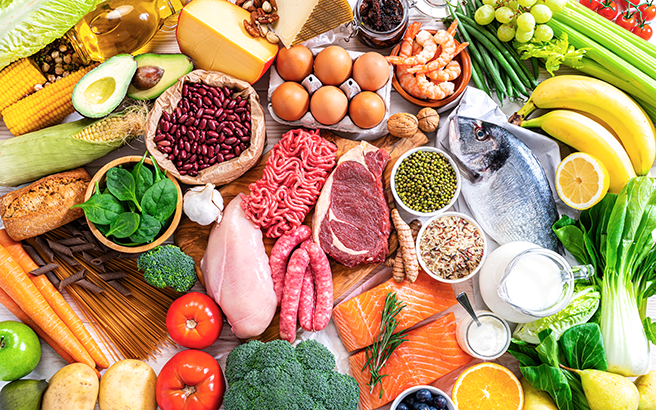Last week we tuned into the first ever UN Food Systems Summit (UNFSS) to see how world leaders, civil society, community groups and the private sector will commit to transforming how our food is produced, transported, sold and consumed.
The lead up to the summit has been marred in controversy, with the Special Rapporteur for Food sharing an array of criticisms, and food sovereignty, land rights and indigenous groups hosting a separate summit to protect a missing human rights focus. There were also concerns how the summit could deliver change in a world flooded by junk food.
We too voiced our concerns following the Pre-Summit in July as there was little mention of health and diet, particularly obesity and diet-related noncommunicable diseases. So, did the Summit exceed our expectations or realise our concerns? It’s fair to say it was a mixed picture. Here are our key takeaways from a diet-related cancer prevention perspective:
Diet-related non-communicable diseases and obesity were slightly more visible
Overall, in the midst of hunger-focussed statements, only a handful of country leaders addressed the relationship between healthy diets and non-communicable diseases.
The heartening statement by the Prime Minister of Fiji called for financing to tackle the NCD crisis; for enforcement and legislation limiting industry interference; and for stronger accountability mechanisms. Palau and Barbados also made similar interventions, while Poland addressed food labelling and Norway pledged to reduce premature deaths from NCDs. We remain hungry for leaders to acknowledge the role of the food system as a determinant of health.
The UNICEF Chief highlighted to the crisis in children’s diets, commercial determinants and environmental factors that lead to “markets being flooded with unhealthy food”. Like WHO’s Dr Tedros, they both appealed to change the way unhealthy foods are marketed, which was also reiterated by Zero Obesity Champion Pau Gasol.
New diet-focused Coalitions of Action
26 emerging coalitions, initiatives and alliances have been developed as part of the Summit, three of which focus on diet. We expect more information to be released in the coming weeks, but here is what we know now about them:
- Coalition of Action for Healthy Diets from Sustainable Food Systems for Children & All which will be supported by WHO and will focus on three areas – supplying food, food environments and valuing food.
- School Meals Coalition: Nutrition, Health and Education for Every Child, also supported by WHO and the World Food Programme, will work to ensure that every child has the opportunity to receive a healthy, nutritious meal in school by 2030.
- Coalition of Action for Achieving Zero Hunger supported by FAO, aims to achieve ending hunger, in a sustainable and nutritious way.
Understanding the role of the food environment and individual behaviours
Nutritious and diverse diets are often too costly or inaccessible. This can lead to poor consumer choices – or no choice at all. I urge governments and businesses to work together to increase access to healthy diets, including by incentivizing new behaviours.
UN Secretary-General António Guterres
The opening comments from the UN Secretary-General acknowledged the barriers faced by many to access healthy nutritious food. However, the onus was on incentivizing behaviours rather than shaping the food environment – if action is expected to be taken at an individual level, it will not deliver the systems-level transformation or regulatory measures needed.
Corporate capture and conflict of interest
The private sector was front and centre of July’s Pre-Summit and there has been widespread concern about the principles of engagement (WCRF International was a signatory of a letter to summit organiser Dr Agnes Kalibata expressing alarm).
Less visible than in the pre-summit, the private sector was still positioned as a key player featuring in the UN Secretary General’s speech. Given the track record of industry interference in policy making (check out our Building Momentum reports for examples), this sets a very dangerous precedent for other UN events and processes. The door remains open for business to continue to greenwash their reputation as they pledge investments to the Zero Hunger Coalition.
Commitments and accountability
To date, there are 232 registered commitments for action by a range of stakeholders, which vary in content and ambition. It’s fair to say that that commitments in the registry are hard to navigate, with Member States’ contributions hidden away in statements and often with scarce information.
As to what happens next, a system of follow-up and review actions to ensure that the Summit’s outcomes sustain momentum until 2030 is disappointingly not in place yet. In the absence of official mechanisms, an independent civil society monitoring mechanism “The Accountability Pact” has mobilised over 250 experts to monitor commitments.
What’s next?
We hope that more information emerges from the UNFSS to resolve the lack of next steps. It was telling that in the preparatory roadmap little was listed after September 2021.
We remain ready to engage in the new coalitions. However, we can see that our role as advocates in cancer prevention and diet related NCDs is as important as ever to ensure that the links between health and food are represented. As to whether the Summit will deliver the transformation it champions, that is to be seen.

